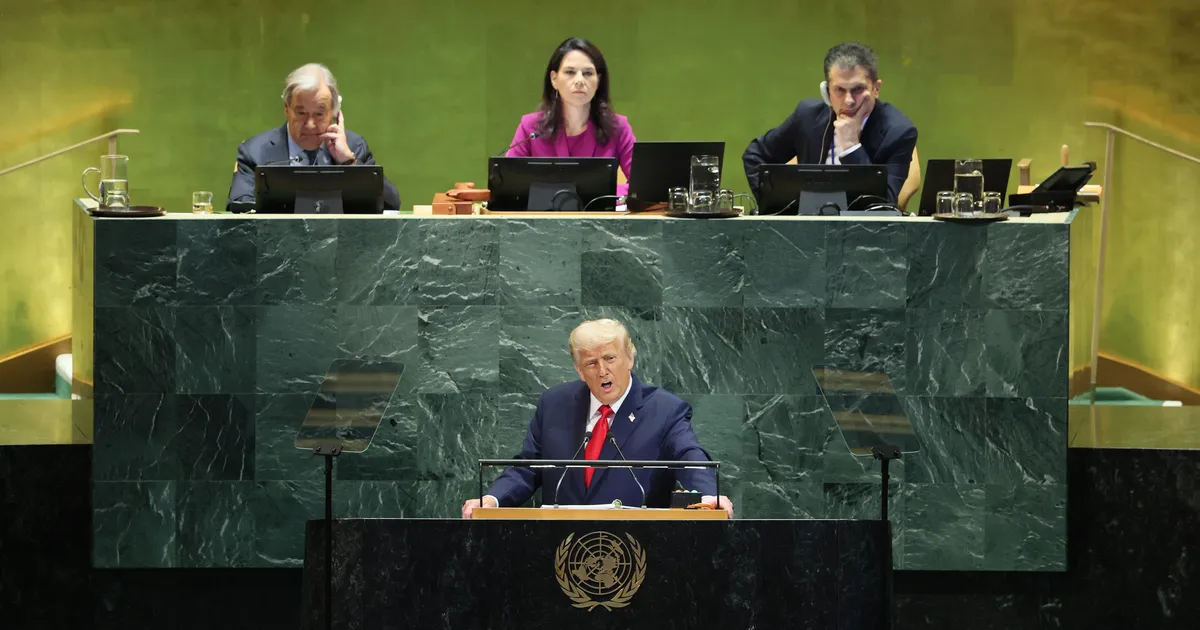
American mass media has been transformed in these early months of President Donald Trump’s second administration. We’re about 35 weeks into a term that will last for 173 more, and in that time, we have seen a tech titan gut a once-great newspaper in an apparent act of capitulation to the commander in chief, government accounts gleefully spreading hateful memes on X (the far-right platform owned by a billionaire tech oligarch), a defamation lawsuit filed by Trump against The New York Times (and quickly dismissed by the judge as “superfluous”), and, of course, the assault on free speech carried out by Trump’s Federal Communications Commission chairman. Big things can happen very quickly.
Here is what seems to be next: TikTok’s U.S. operations are reportedly on the cusp of being sold to a group that includes Trump allies, led by yet another tech baron, Larry Ellison. Although the deal is not yet complete, the White House has told reporters that the arrangement will result in the social app’s algorithm being leased to a consortium led by Ellison’s company, Oracle, and by the investors Andreessen Horowitz and Silver Lake. This promises to resolve long-standing concerns that the Chinese-owned TikTok might give an adversarial foreign government the capacity to influence and monitor the social-media behavior of U.S. residents. But at the rate things are going today, we should be far less worried about what foreign governments could do with our social-media information than about how our own government might abuse it. (A spokesperson for the White House did not respond to my request for comment.)
Five years ago, Trump signed an executive order warning Americans about the potential for TikTok to be used as a dangerous surveillance tool. He wrote then that the app’s “data collection threatens to allow the Chinese Communist Party access to Americans’ personal and proprietary information—potentially allowing China to track the locations of Federal employees and contractors, build dossiers of personal information for blackmail, and conduct corporate espionage.” This warning is warranted, to a degree. President Xi Jinping would probably have a hard time engineering the downfall of America through the media served on TikTok, where it’s always been more likely that you’ll encounter waves of brain rot rather than anything that seems like genuine mind control, but the potential for digital surveillance through social media is very real.
Apart from its Chinese ownership, TikTok is not much different from Facebook, Instagram, YouTube, and X. Each of these platforms has an opaque algorithm that determines the content that users will see. The algorithm manipulates users, but primarily with the goal of keeping them on the platform and seeing more advertisements. The platforms also gather compendiums of data on what we view, like, share, and comment on. The U.S. has taken the position that these practices are a massive threat when a social-media platform is under foreign ownership, but it has been willing to allow them when the manipulation and surveillance take place within our own national boundaries.
There has been no indication that Trump or his administration would have direct control over the platform. But with close allies in command, it would seem that there’s a clear line for the president to influence and bend the platform to his will. One thing that social-media platforms are already tremendously adept at is building “look-alike” models of users. This was Facebook’s big advertising breakthrough a decade ago—the 2016 Trump campaign figured out how to acquire donors by showing campaign ads to people with similar social-media likes and preferences as the existing base of MAGA supporters. What happens if social media’s data-gathering and profiling engine is turned not to selling merch or promoting political rhetoric, but to profiling enemies? Just this week, Trump issued an executive order designating “Antifa” as a domestic terrorist organization (despite the fact that antifa is not an organization at all). Imagine if the administration asks its newly anointed TikTok leadership to pinpoint a set of supposedly hateful, far-left media outlets, and then generate lists of social-media users who view, share, and comment on such media. Or imagine if it asks Ellison et al. to identify clusters of people who view and share videos attacking ICE, criticizing “Alligator Alcatraz,” or protecting the undocumented. Look-alike models are a danger in the hands of a budding authoritarian state.
Oracle did not immediately respond to my request for comment, and Ellison will certainly not be the only one in charge of TikTok if the deal goes through as planned. His company is just one of three named investors, and there would be a board of directors—but it’s a safe bet that anyone given power here would be viewed by the Trump administration as friendly. And Ellison has offered some relevant perspectives on key issues. Last year, he boasted to Oracle investors about the potential for harnessing artificial intelligence for panoptic surveillance: “Citizens will be on their best behavior because we’re constantly recording and reporting everything that is going on,” Ellison, who serves as the company’s chief technology officer and executive chairman, remarked. “It’s unimpeachable.” Ellison has also said that countries should try to “unify” as much data as possible to allow that information to be used by AI; the Trump administration appeared to be making such efforts earlier this year through DOGE.
The protections of the First Amendment are supposed to guarantee that Americans have little to fear from U.S. government surveillance and manipulation. But that is an ever-quainter assurance. Just look at how many public officials responded to social-media chatter over the assassination of Charlie Kirk. Secretary of State Marco Rubio said that the country would deny visas to anyone “celebrating” Kirk’s death. Deputy Secretary of State Christopher Landau directed government officials to “take appropriate action” against anyone “making light of” Kirk’s untimely demise. And ABC abruptly suspended Jimmy Kimmel Live after FCC Chairman Brendan Carr appeared on a right-wing podcast and declared, “We can do this the easy or the hard way,” in response to Kimmel’s insinuation that the alleged shooter may have been part of the “MAGA gang.” (Kimmel’s show is now back, though Nexstar and Sinclair, major broadcast-station owners, said that they would not air it.) As the Atlantic staff writer David Frum put it on X, “It’s not about ‘cancel culture’ because it’s not about ‘culture.’ It’s about a threat of legal retaliation by a government agency for not obeying a government edict. It’s state repression, not social sanction.”
The Onion had a joke headline last week: “Report: You to Be Fired for Reading This Headline About Charlie Kirk.” The U.S. government cannot currently target you for watching the wrong programs or laughing at the wrong jokes. It does not currently have the capacity for that sort of surveillance at scale. But it sure seems that it would like to.
In an ideal world, Congress would establish a regulatory framework for all online platforms, regardless of ownership, requiring algorithmic auditing and placing reasonable limits on digital surveillance and data collection. This should have happened a long time ago. But we don’t live in an ideal world. We’re stuck living in this one.



